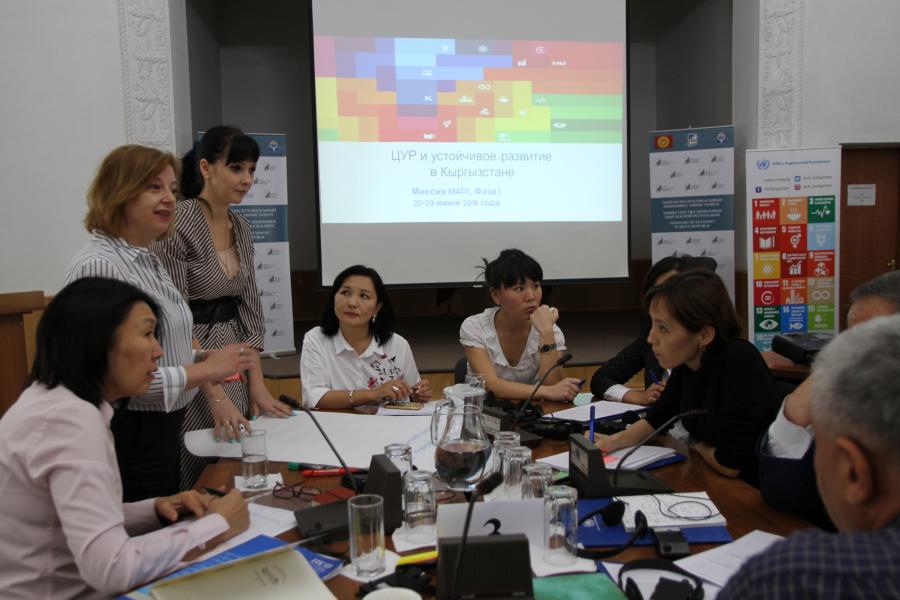MAPS Mission from Millennium Development Goals to Sustainable Development Goals: Support for Inclusive and Sustainable Growth in Kyrgyzstan
26 May 2018
- Today, 26th of June, 2018, the United Nations’ MAPS (Mainstreaming, Acceleration, and Policy Support) had its first session at the Ministry of Economy for government officials across ministries and agencies to discuss mainstreaming the Sustainable Development Goals (SDGs) in the national programs and strategies of the country and adopting the SDGs to the country’s development needs and priorities through mainstreaming, acceleration, and policy support (MAPS).

Minister of Economy Oleg Pankratov stated that the MAPS mission will help develop cross-sectoral solutions, identify issues hindering the acceleration, and define in its Roadmap to the development accelerators to achieve the Sustainable Development Goals in Kyrgyzstan.
In his opening speech, UN Resident Coordinator Ozonnia Ojielo said, “Every county has to chart its development path. When we look at the draft National Development Strategy, when we look at the “Unity, Trust, and Creation” Strategy, when we look at the Strategy for Development of the Regions, what is clear is that Kyrgyzstan is in search for its development pathway. We commend you on this unique approach to define for your country and for your people what you see as your pathway to development. Nobody can come to Kyrgyzstan and tell you how it is done. Our role as the United Nations System is accompaniment. We have to walk the journey with you. We will share the best possible ideas, we will share the best possible analysis, we will offer you some suggestions for your consideration on the way to development. One of the key questions this mission will help to answer is to validate the accelerators you have identified for your structural economic transformation, do the analytics, and bear out the choice what could be the accelerators. The second is what is the roadmap to these accelerators to speak to the national needs. In terms of policy, what is the policy approach between ministries and institutions in an integrated framework that allows you to realize your ambitions. But much more importantly, how it is going to be paid for. Where the financing will come from. We look at the tax revenues for Kyrgyzstan, we look at ODA, remittances, different forms of financing and hopefully offer some suggestions to compliment the discussion that are taking place within the government.”
And the MAPS mission’s visit is very timely as it will help define the roadmap to development accelerators as core priorities within the government’s broader strategies in order to achieve structural transformation of the country both in terms of economy and society, and position the country within the region. The MAPS roadmap and its continued support will help the Government of Kyrgyzstan to work much more effectively in achieving our Sustainable Development Goals and can potentially serve as platform to have a strategic dialogue with the government’s development partners.”
During the technical seminar the working groups discussed policy initiatives and measures aimed at improving the alignment of national priorities with SDGs, defining the accelerators for achieving the SDGs, studying institutional coordination mechanisms for improved monitoring of SDGs and the financing and budget development.
The participants of the technical seminar have identified the key development areas that require the government’s attention, as well as cross-sectoral coordination. The main priorities, identified by the participants, included the rule of law, digital governance and services, development of green economy and capacity building. All these priorities are reflected in the SDGs.
MAPS Team Leader George Bouma noted that the UN is ready to support the Government in realization of the national priorities in a best effective way through partnership with international organizations, state institutions, donor organizations, and civil society.
Upon completion of the visit the mission will prepare a Roadmap for the government, which will serve to translate the assessments, consultations, and stakeholder dialogues held during the mission into a concrete and practical tool to guide further action at the country level on the implementation of SDGs.
On 1 January 2016, the 17 Sustainable Development Goals (SDGs) of the 2030 Agenda for Sustainable Development — adopted by world leaders in September 2015 at an historic UN Summit — officially came into force. Over the next fifteen years, with these new Goals that universally apply to all, countries will mobilize efforts to end all forms of poverty, fight inequalities and tackle climate change, while ensuring that no one is left behind.
The SDGs, also known as Global Goals, build on the success of the Millennium Development Goals (MDGs) and aim to go further to end all forms of poverty. The new Goals are unique in that they call for action by all countries, poor, rich and middle-income to promote prosperity while protecting the planet. They recognize that ending poverty must go hand-in-hand with strategies that build economic growth and addresses a range of social needs including education, health, social protection, and job opportunities, while tackling climate change and environmental protection.
In response, the UN Development Group has committed to a common approach for effective and coherent implementation support entitled ‘MAPS’. MAPS stands for Mainstreaming, Acceleration and Policy Support. Mainstreaming refers to landing the SDGs into national, subnational and local plans for development and shaping budget allocations. Acceleration focuses on targeting resources and interventions to areas that can have maximum impacts across various goals and targets. Policy support refers to ensuring that the skills and expertise of the UN development system are rendered available in an efficient and timely way.
For more photos please go here.

